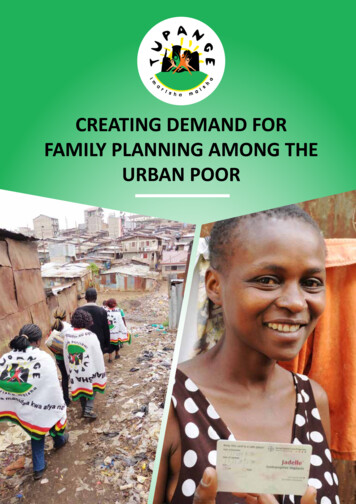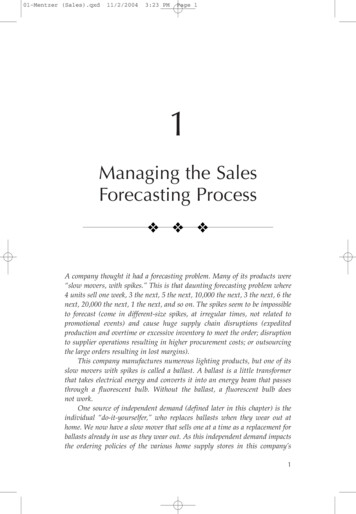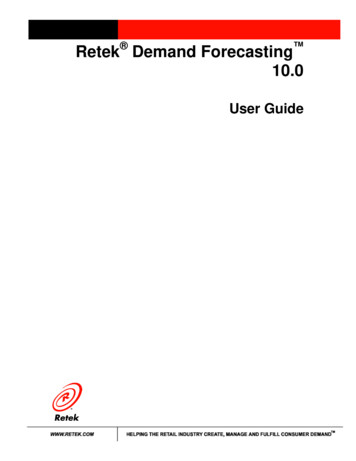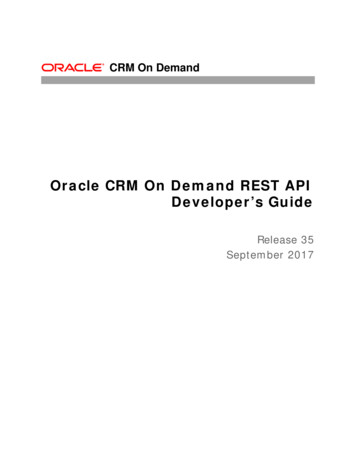
Transcription
CREATING DEMAND FORFAMILY PLANNING AMONG THEURBAN POOR1
This report was prepared by the Johns Hopkins Center for Communication Programs (CCP),which was responsible for the demand creation activities of Tupange, a project managed bythe Jhpiego Corporation with funding from the Bill and Melinda Gates Foundation.The demand creation activities described in this document were implemented between 2010and 2015 in partnership with 13 youth groups and County Health Promotion Officers by thefollowing CCP staff:Rael OdengoDebra GachuhiGeorge KahuthiaCollins OtienoBetty Wanjiku MuthoniNimrod SillaMichael OwuorMonica WanjiruCCP would like to thank Mr. Nelson Keyonzo, Director of the Tupange Project, for his leadershipand vision, and to the entire Tupange team, who contributed greatly to the success of theproject, and to the development of this document.EDITORS:Tine Frank, Cheryl Lettenmaier, Rael Odengo, Manya DotsonCONTRIBUTORS:George Obanyi, Beatrice AmolloPHOTOGRAPHERS:Nimrod Silla, Tine Frank, George Obanyi, Beatrice Amollo, Collins OtienoGRAPHIC DESIGN:Osmosis Media2
CREATING DEMANDFOR FAMILYPLANNING AMONGTHE URBAN POOR2010-20153
PrefaceOver the last decade, Kenya’s population grew from about 29 million in 1999 to roughly 41 million in 2015. This rapid growthhas contributed to a host of challenges for government and citizens alike. Leaders are increasingly committed to slowingpopulation growth to sustainable levels.Several key national documents, including Kenya’s new constitution, address reproductive health in general and familyplanning explicitly. In the new constitution, Article 43 on economic and social rights gives specific attention to health rightsby declaring that “every person has the right to the highest attainable standard of health, which includes the right to healthcare services, including reproductive health care.” Vision 2030 (a development plan for the economic, social and politicalpillars of Kenya) aims to transform Kenya into a “middle-income country providing a high quality of life to all its citizens in aclean and secure environment” by 2030. Family planning has been identified as a key strategy if the vision is to be achieved.These documents have sparked a robust national dialogue around family planning. In November 2010, a National PopulationLeaders’ Conference was convened whose theme was Managing Population to Achieve Vision 2030: Healthier Families for aProsperous Kenya.In line with these strategies and the Millennium Development Goals, the Government of Kenya has set the goal of increasingthe use of family planning to 70 percent of women aged 15–49 by 2015.1In this context, where decision-makers recognize the ever-increasing importance of family planning, it is my pleasure topresent this booklet on Creating Demand for Family Planning among the Urban Poor produced by the Tupange UrbanReproductive Health Initiative for public use.The demand creation activities described in this booklet were implemented in five cities (Nairobi, Kisumu, Mombasa,Kakamega and Machakos) in partnership with 13 youth groups and working closely with Ministry of Health personnel,County Health Promotion Officers and Community Health Volunteers.Although a lot of documentation has been done on family planning in Kenya, this booklet is unique in that it clearly describesvarious approaches used to successfully create demand for family planning in urban Kenya. It is the first document to lookat demand creation strategies for the urban poor.The report documents the demand creation activities of the Tupange project intervention for the greater community ofpublic and private actors working toward achieving the national health goals described above. My hope is that this bookletwill inform the design of future demand creation activities, as we all work together to make family planning a communitynorm in order to reach our ambitious national goals.Dr. Josephine Kibaru MbaeDirector General- National Council for Population and Development.Ministry of Devolution and Planning.1 Ministry of Health, The Second National Health Sector Strategic Plan of Kenya (NHSSP II-2005-2010).4
FOREWORDThe Bill & Melinda Gates Foundation launched the Urban Reproductive Health Initiative as part of its Family Planning/Reproductive Health Strategy, with the goal of significantly increasing modern contraceptive prevalence rates in selectedurban areas of Kenya, Nigeria, Senegal and Uttar Pradesh-India. The Tupange Project is the Kenyan Urban ReproductiveHealth Initiative, which has been implemented from 2010 through 2015.We are delighted to present this booklet outlining the various strategies employed by the Tupange Project to create demandfor family planning services within five Kenyan urban slums. This report was prepared by the Johns Hopkins Center forCommunication Programs (CCP) and Jhpiego Corporation to share our experiences in the hope that they will be replicatedand continued into the future.We would like to acknowledge the untiring efforts of the entire Tupange team, including Technical Advisors, and CityManagers. The activities described in this booklet would not have been possible without the collaboration of County HealthPromotion Officers, Community Health Volunteers, the media and the many family planning service providers who tirelesslyoffer family planning services for Kenyans rich and poor. We are also grateful to Ms. Manya Dotson and Gideon Mureithi ofJhpiego Corporation Kenya who assisted with the design and layout of this booklet.Cheryl LettenmaierRegional RepresentativeThe Johns HopkinsCentre for Communication Programs5Nelson A KeyonzoNelson A. KeyonzoDirectorTupange ProjectJhpiego Kenya
CONTENTSChapter 1 Introduction to TupangeOverviewThe Context67Chapter 2 How did Tupange Create DemandThe Celebrate Life – Use Family Planning StrategyRadio ProgrammingTelevision and Video ProgrammingYouth-led Community-based ActivitiesDemand Creation MaterialsTraining Service Providers in IPC691013142224Chapter 3 Evidence of Impact26Chapter 4 Tupange Partner Youth Groups30
CHAPTER 1INTRODUCTION TO TUPANGE7
MOH Community Strategy Coordinator, Judy Wairiuko, with Nyuki Zalendo youth group members during family planning demandcreation activities in Kibera, Nairobi.OverviewTupange, a Kiswahili word that means ‘let’s plan’, is the brandname of the five-year Bill and Melinda Gates Foundationfunded Kenya Urban Reproductive Health Initiative (KURHI)implemented in Nairobi, Mombasa, Kisumu, Machakos andKakamega between 2010 and 2015. Led by Jhpiego Corporation,the project was implemented in partnership with MarieStopes International, Pharm Access Africa Ltd., the NationalCoordinating Agency for Population and Development, andthe Johns Hopkins Center for Communication Programs (CCP).Tupange worked closely with the Ministry of Health, countygovernments, and an array of local implementing partners toensure its interventions are sustained beyond the end of theproject, and are in line with government policies.Tupange’s goal was to achieve a 20 percentage-point increasein contraceptive prevalence rates in each of the selected urbancentres, particularly among the urban poor. Strengthening bothsupply and demand sides of the family planning programme, itemployed a capacity strengthening approach to ensure futuresustainability of interventions.8On the supply side, Tupange worked with both public andprivate sector service providers to improve access and qualityof family planning services; strengthened the contraceptivesupply chain; and advocated for policies that support provisionand use of family planning among the urban poor.On the demand side, Tupange employed entertaining andeducative strategies to create a social environment thatsupports and lowers barriers to contraceptive use. Under thetechnical leadership of CCP, Tupange employed three principlestrategies to do this: Disseminating targeted media messaging; Engaging youth groups to implement entertaining andeducative community mobilisation activities; and Strengthening the capacity of clinical and community basedproviders to communicate about family planning.This booklet shares Tupange’s demand creation approaches.
The ContextWhen the project began in 2010, Kenya’s family planningprogram was in a period of stagnation. Contraceptive prevalencestood at the 1998 level of 39%, and the total fertility rate, at 4.6in 2009, remained virtually unchanged from 1998 (4.7) i, ii.Contraceptive use among poor Kenyans, who form the majorityof the country’s population, remained low, largely becauseof inadequate access to services, negative attitudes towardmodern contraception, and lack of awareness about theiroptions. Kenya, once thought to be one of the first Africancountries to enter the demographic transition, had stopped itstransition.While family planning indicators stagnated, Kenya’s urbanpopulation was accelerating. In 1999 the urban population was5.37 million, a 35% increase from 1989. Much of this increaseoccurred in Nairobi, which rose from 1.32 million people in1989 to an estimated 3.24 million people in 2009, more thandoubling in size.Health officials and donors historically paid scant attention tothe urban poor, as many believed physical location in citiesmeant easy access to services. The reality is more complex.The barriers to family planning uptake and sustained use by theurban poor are numerous. Data from the African Populationand Health Research Centre (APHRC) showed that almost halfof all children born to poor women in urban Kenya were eitherunwanted or mistimed, and close to 25% of all married womenhad an unmet need for family planning compared to 13% ingreater Nairobi iii.It was against this background that the Tupange project demandcreation activities began in Nairobi, Mombasa and Kisumu,eventually expanding to Kakamega and Machakos.Kenya DHS 2009Data sources: Kenya Fertility Survey report (1977-78); the Kenya Census reports (1989 and 1999); and the Kenya Demographic andHealth Survey reports (1987 and 2003)iiiAPHRC: Population and Health Dynamics in Nairobi’s Informal Settlements In Nairobi: African Population and Health Research Center; 2002iii9
CHAPTER 2HOW DID TUPANGE CREATEDEMAND?A MOWEPE youth group member engages men in conversation about family planning, Mombasa.10
The Celebrate Life – UseFamily Planning StrategyTupange employed a three-prong approach to make familyplanning a common conversation and increase uptake ofcontraceptive methods among the urban poor in Nairobi,Mombasa and Kisumu, and eventually Kakamega andMachakos: Producing and broadcasting targeted media messagesEngaging youth groups to implement entertaining andeducative community mobilisation communication skills among clinical and communityhealth workers.income residents of Nairobi, Mombasa and Kisumu. Basedon an analysis of this audience research, Tupange designedthe Celebrate Life – Use Family Planning demand creationstrategy during a workshop of stakeholders from the threeinitial project cities. The strategy’s core messages confronttwo key barriers to contraceptive use among non-users in thethree cities: misconceptions and fears surrounding modernmethods, and normative social attitudes that discourage theuse of contraceptives.To attract large audiences and hold their attention whilepromoting family planning, Tupange employed entertainingand fun community events and media programming.Tupange developed this approach and its message strategiesthrough a participatory process that began with a reviewof existing research and qualitative research among lowerMembers from Sanaa Utamaduni youth group mobilise their community for family planning services.11
Radio ProgrammingRadio is pervasive in urban Kenya, with a wide array of radiostations broadcasting to this audience, ranging from nationaland regional stations to smaller community stations. Withmore than 70% of urban adults listening to the radio regularly,it was a natural communication channel for Tupange.In 2012, Tupange partnered with Kenyan organisation WellTold Story to create the award-winning, popular radioserial drama programme called Jongo Love. Designed forurban youth in Nairobi, Mombasa and Kisumu, Jongo Lovewove together realistic and engaging depictions of the livesof urban youth to communicate messages about familyplanning in a way that urban youth could relate to.A Jongo Love recording session12
The series addressed socio-cultural barriers, myths andmisconceptions about contraceptives as well as other factorsthat hinder family planning uptake and continuation. JongoLove broadcast a total of 36 episodes between January 2013and January 2015, on 7 radio stations. In addition, Tupangesponsored family planning content in 10 volumes of thepopular Shujazz comic book series, which had a circulationof 500,000 per volume. To track audience reactions andgenerate discussion about the series’ topics, Tupangeestablished a dedicated text message address, a Facebookpage, and videos on YouTube. Tupange also formed listeninggroups in Mombasa, Nairobi and Kisumu that met weekly todiscuss issues raised during the episodes.family planning from service providers. After the World Cup,Tupange continued broadcasting these spots during radiotalk shows in Mombasa and Kisumu, reaching an estimated200,000 people.Youth groups formed 44 listenership groups that directlyengaged 1,235 youths in weekly discussions of topicsfeatured on Jongo Love episodesDuring 2014, Tupange partnered with community radiostations in Mombasa, Nairobi and Kisumu to produce weeklycall-in radio talk shows, featuring family planning expertsand satisfied users from those cities. These locally producedprogrammes proved to be very popular, generating manycall-ins from listeners. In Kisumu, two of the programmeswere recorded live during road shows featuring drama, musicand dance by a local youth group, CHEI, trained by Tupange.In 2014, capitalising on ‘World Cup fever,’ youth groups inKisumu and Mombasa produced short radio spots thatbroadcast during World Cup matches on community radiostations. With a touch of humour, spots dramatized typicalsituations affecting men in those cities when they do notplan their families, and called on them to talk about familyplanning with their wives and get more information about13“I have this feeling, that through a programmelike Dak Achana [the call-in talk show produced byTupange in Kisumu], the women are no longer silentrecipients. They want to talk and ask questionsand get information. They have been empowered.Also, the men are now asking questions on theshow. They are interested and concerned.”Jael Lieta,presenter/producer, Dak Achana, RadioNamlolwe, Kisumu
RADIO TO CHANGE HEARTSAND MINDSpreviously she fell pregnant and went for an illegal abortion.“I never knew until then,” says Lucy, visibly shocked. “Thistime, she was four months pregnant, and had gone for anabortion the day before she came to our house. My firstreaction was to send her away from home because of theshame she had brought on the house and the family. Butthe counsellor convinced me to first think about it anddiscuss it with my husband. Then, I listened to the radioshow again, and it gave me a change in attitude that familyplanning is very important for the youth.”“I used to think family planning was only for marriedpeople. I was surprised when I heard them talking aboutit for the youth on the radio.” Lucy Owiti’s initial reaction,when she listened to the Dak Achana programme on RadioNamlolwe in Kisumu, was that it was a bad idea to promotefamily planning to youth like her 16-year-old daughter. “Myfirst thought was that it would only encourage the youthto be promiscuous. But then something happened to mydaughter that made me change my mind. She came backfrom boarding school because she was sick. The next day,while I was at work, my neighbours came and told me shewas bleeding and having a miscarriage. We took her to thehospital where she had a physical examination, and afterthat we spoke to the counsellor together.”During the counselling, the girl opened up and admittedthat this was, in fact, her second pregnancy. Three yearsLucy was still reluctant to take the girl for family planningservices, fearing that she would be recognised and judgedby her friends and neighbours. “I worried they would thinkI was encouraging her to have sex. But one of the radiopanellists advised me of a family planning outreach daytaking place near the airport, so we went there, and mydaughter received the services in private.”Dorcas Ogutu, a Community Health Extension Workerand regular panellist on Dak Achana feels the programmehas had a great impact. “When we discuss myths andmisconceptions surrounding family planning on theprogramme, and explain things properly, people usuallyend up believing. It has been a real eye opener to a lot ofpeople, especially men.”“You can tell from the responses and thequestions we get from the audience that we arecovering a wide range of critical issues.”John OjijiDak Achana panelistThe names in this story have been changed to protect the individuals’ identities.14
Television and VideoProgrammingMore than half of all women and almost all men livingin the project cities watch television regularly. Tupangeleveraged family planning messages during popular televisionprogramming. In 2011, Tupange sponsored two episodes of aTV programme called Matatu. The show takes place inside amatatu (a minibus taxi), which gives free rides to passengers inexchange for being part of a small group discussion on differenttopics. For the Tupange episodes, the topics revolved aroundfamily planning and family size. According to the TupangeMidterm Evaluation conducted by MLE, 58% of men andwomen in Nairobi, 31% in Mombasa, and 27% in Kisumu werefamiliar with the Matatu family planning programmes.In 2014, four Tupange-supported youth groups in Nairobi(Shangilia Youth to Youth Network, Tuungane Youth Initiative,Taiwe Foundation and Zindua Jamii) were selected to produceshort television dramas about family planning that werebroadcast in video dens during World Cup matches.The Shangilia Youth to Youth Network filming a short family planning drama for broadcast in video dens duringWorld Cup matches15
Zindua Jamii youth group performance to mobilise community members for family planning servicesYouth-Led CommunityBased ActivitiesMore than half of Kenya’s population is younger than 20 yearsold, with 42% of Kenyans under 15 years of age. Nowhere isthis youthful population felt more acutely than in the cities, asyoung people flock there in search oflivelihoods, education, and a betterfuture. Overall, the five project citieshave very young populations, withabout 40% of women falling betweenthe ages of 15 and 24.The need for contraception is also highamong younger women. The 2010Tupange baseline survey conductedby MLE found that the peak age forchildbearing was 20–24 across allthe five cities, and early childbearingamong 15–19 year old women wasalso prevalent, especially in Kisumu.Consequently, Tupange focused muchof its attention on youth aged 15–24years.While young people have a greatneed for family planning, they arealso an immense resource. Duringinitial situation analyses, Tupange discovered a number ofyouth groups operating in the five cities. Several of these groupswere already involved in HIV prevention or other health-relatedwork, and many were drama, dance and music performers.16Tupange’s demand creation strategy was to reposition familyplanning as a social norm and convert unmet need into demandfor family planning among the urban poor. To achieve thisobjective, the project engaged 13youth groups across the five citiesto identify gaps and barriers tomeeting family planning needs,and tailor community mobilisationactivities to address these, usinganentertainment-educationapproach.Tupange trained the youth groupsto be able to talk about familyplanning, and provided job aidsand informational materials. Theyouth groups used their talentsas performing artists to mobilisewomen and men for family planningservices, and start conversationsabout family planningandcontraceptive methods in theircommunities.
Between 2012 and 2015, youth groups reached more thanhalf a million people through a wide assortment of activities,designed to increase contraceptive use, many linked to freefamily planning outreach and in-reach services, including: Community theatre Video den shows Football tournaments Bodaboda (bicycle and motorcycle) races Mini-caravans Town criers Beauty pageants Maskanis Radio listening groups Beach Information Cafeterias Gwaride“I used to be ignorant when it came to familyplanning, until I met the youths from MOWEPE,who kindly invited me to one of the Tupangeoutreaches, where I met the service providers.This has given me happiness in my marriage,because I became able to discuss family planningwith my husband, after which we agreed that Ishould get contraceptive implants.”Cynthia OminaChangamwe, Mombasaprovided more detailed information about family planning andoffered services.Members of the CHEI youth group in Kisumu performcommunity theatre to encourage male involvement infamily planningOver the life of the project, youth groups performed 1,592community dramas, reaching a total of 261,989 men and womenduring outreaches and 234,711 during in-reach services.In addition to creating demand for family planning services,many of the partner youth groups have improved performanceskills and visibility, and have been engaged by otherorganisations and government agencies, increasing the groups’income revenues and sustainability.Community TheatreCommunity theatre is a recognised style of edutainment designedto draw the attention and participation of crowds, creating reallife situations in an environment that encourages audiences toopen up and discuss sensitive issues. Several of the youth groupsselected to work with Tupange were already experienced in thisactivity. Through training sessions covering family planning,audience segmentation, and message development, the youthgroups were enabled to tailor performances to address fearsand misconceptions about family planning that were commonamong particular audiences. During performances, youth groupmembers trained as facilitators ensured maximum audienceparticipation, guiding and keeping discussions on topic.During the last three years of the project, youth groupsconducted community theatre performances, often timed tocreate demand for specific Tupange family planning outreachservices, where Community Health Volunteers counselled and17“I used to have fears about family planningfrom stories I had heard. During one of ZinduaJamii’s performances, common myths andmisconceptions were addressed and accurateinformation was given. With this knowledge, Ibecame more confident to seek family planningservices and I now use a long term method.”JacintaEmbakasi, Nairobi
Mini-CaravansThe mini-caravan is a Tupange innovation, adapted from largerroad shows that use big trucks and vehicles in procession.As roadshows can be costly and struggle to navigate smallerestate and community roads, Tupange instead employed smallbranded pick up trucks from which youth group membersdelivered family planning messages and mobilised for outreachand in-reach services using loudspeakers and PA systems.Through an analysis of available data, Tupange staff and serviceproviders planned mini-caravan routes to focus on areas whereuptake of family planning services was low. Stopping at strategicpoints, youth group members conducted dance, music andacrobatics performances to attract and entertain people. Oncea large crowd had gathered, a facilitator and Community HealthVolunteer interacted with community members, answeredquestions, and provided information on family planning andwhere to go for free services. They also distributed informationalmaterials and free condoms before moving on to the next stop.Sanaa Utamadani youth group members educate video denaudiences on the importance of family planningVideo Den ShowsIn an effort to reach the crucial demographic of young maleswith family planning messages, youth groups organised severalcommunity-based activities to increase male involvement.Particularly successful in doing so were the ‘Video Dens’activities launched during the 2014 World Cup.Selected youth groups in Nairobi produced and acted in shortvideo dramas that focused on family planning. These dramaswere used by the nine Nairobi youth groups, broadcastingthem in 27 local video dens during and after World Cupmatches. Youth group members trained as facilitators led groupdiscussions, provided correct information on family planningand distributed Tupange informational materials. They alsoconducted exit interviews to assess the activity, interviewing3,615 men and women viewers. Nearly all said they would liketo view the videos again, and 62% correctly recalled the familyplanning messages.18“By using mini-caravans, dance and skits, weattract a large number of people, as many as500 women in some places. This makes it mucheasier for Community Health Volunteers to makereferrals for services.”Moses Matukho Musita,Chairperson, Taiwe Youth Group
Football TournamentsYouth groups organised football tournaments, reaching largenumbers of young men and women, and holding their attentionfor a significant amount of time. To maximise community buyin and turn out, Tupange planned tournaments together withlocal community leaders. Mobilisation took place two days priorto the event, and during the full-day tournament youth groupmembers shared family planning information through focusgroup discussions, quiz sessions, one-on-one conversations,and distribution of informational materials – all in an informaland relaxed setting. Community Health Volunteers were presentduring some tournaments offering advice and referrals, andyouth group members made referrals to upcoming outreachesor in-reach services. In many cases, family planning serviceswere provided during the event.In addition to football tournaments, partner youth groupsorganised regular ‘Tupange-lympics’ events that, in a similarformat, reached large numbers of community membersthrough sports and games. In Kisumu, Tupange conducted four‘Tupange-lympics’ reaching 1,984 people with information andservices.Youth motivational speaker, Vincent Kegode, addresses the youth during a football tournament organised by Nyuki Zalendoin Kibera, Nairobi“I used to have a lot of misconceptions aboutfamily planning methods. I ‘knew’ that the pillscould make you sterile and that condoms oftenhad holes in them. But during the footballtournament sessions, by the end of the day, themyths were gone and the knowledge was there.I started using family planning after that, andjoined the group.”Njeri Catherine,Sanaa Utamaduni youth group member19
BodaBoda RacesBodabodas (bicycle and motorcycle taxis) are a common meansof transportation in many cities across Kenya, particularly inKisumu. Engaging bodaboda drivers with regards to familyplanning has two major advantages: the opportunity toeducate a great number of men, a key target demographic; andto tap into a large population including the bodaboda drivers’networks that can include hundreds of thousands of men, withinformation cascading down to their customers.demand for family planning services. Each event was precededby two orientation sessions on family planning, and the roleof men as family planning champions and advocates in theirhouseholds and communities. A total of 566 people attendedthe two events that led to the formation of a male forum onfamily planning in Nyalenda community.Town CriersA town crier – quite simply a person with a megaphone – isa no-frills and cost-effective mobilisation method, ideal for thedensely populated urban settlements in which Tupange worked.Tupange trained youth group members and Community HealthVolunteers to deliver messages and information on familyplanning through this low-cost method. Town criers madeannouncements for Tupange family planning outreaches, orspecific days when partner health facilities offered free familyplanning services. To optimise attention for the town crier,youth group members often accompanied him/her, performingdance, dramas or acrobatics in order to draw in the crowds.Often, Community Health Volunteers were present, seizingthe opportunity for one-on-one discussions about the benefitsof family planning and distributing Tupange informationalmaterials.“The bodaboda race is a wonderful activity, andgave us the chance to interact and discuss familyplanning with the Tupange people. Some of usused to think that family planning methods wouldlower our libido, and other misconceptions, butthrough the discussions we slowly changed ourattitudes. Now, I say ‘If you don’t plan you messwith your life. You want to eat every day, don’tyou?’ These days, my wife sees me as someonewho is informed.”Nelson Ochieng Odire,Chairman Nyanza BodaBoda Network, KisumuWorking closely with leaders within the bodaboda communities,Tupange staff conducted family planning orientations atbodaboda stages (designated places where drivers wait forcustomers) around Kisumu town. During these sessions,Tupange provided information on family planning methodsand services, distributed educational materials, and gave allparticipants branded reflective jackets. These jackets werean excellent discussion ‘tool’ between drivers and customers,and promoted the Tupange project and services to the generalpublic.In addition to this effective peer education by bodaboda driversturned ‘family planning champions’, the Kisumu Tupange staffand youth group organised two bodaboda races to create20A town crier at work in Mombasa“I was impressed by Mispath’s presentationabout family planning. Watching the theatre, allof a sudden we were part of the cast and w
the use of family planning to 70 percent of women aged 15-49 by 2015.1 In this context, where decision-makers recognize the ever-increasing importance of family planning, it is my pleasure to present this booklet on Creating Demand for Family Planning among the Urban Poor produced by the Tupange Urban Reproductive Health Initiative for public .










